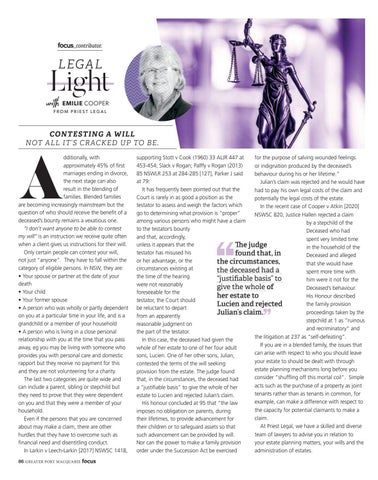focus_contributor.
LEGAL
Light t
EMILIE COOPER
FROM PRIEST LEGAL
CONTESTING A WILL NOT ALL IT’S CR ACKED UP TO BE.
A
dditionally, with approximately 45% of first marriages ending in divorce, the next stage can also result in the blending of families. Blended families are becoming increasingly mainstream but the question of who should receive the benefit of a deceased’s bounty remains a vexatious one. “I don’t want anyone to be able to contest my will” is an instruction we receive quite often when a client gives us instructions for their will. Only certain people can contest your will, not just “anyone”. They have to fall within the category of eligible persons. In NSW, they are: • Your spouse or partner at the date of your death • Your child • Your former spouse • A person who was wholly or partly dependent on you at a particular time in your life, and is a grandchild or a member of your household • A person who is living in a close personal relationship with you at the time that you pass away, eg you may be living with someone who provides you with personal care and domestic rapport but they receive no payment for this and they are not volunteering for a charity. The last two categories are quite wide and can include a parent, sibling or stepchild but they need to prove that they were dependent on you and that they were a member of your household. Even if the persons that you are concerned about may make a claim, there are other hurdles that they have to overcome such as financial need and disentitling conduct. In Larkin v Leech-Larkin [2017] NSWSC 1418,
86 GREATER PORT MACQUARIE
focus
supporting Stott v Cook (1960) 33 ALJR 447 at for the purpose of salving wounded feelings 453-454; Slack v Rogan; Palffy v Rogan (2013) or indignation produced by the deceased’s 85 NSWLR 253 at 284-285 [127], Parker J said behaviour during his or her lifetime.” at 79: Julian’s claim was rejected and he would have It has frequently been pointed out that the had to pay his own legal costs of the claim and Court is rarely in as good a position as the potentially the legal costs of the estate. testator to assess and weigh the factors which In the recent case of Cooper v Atkin [2020] go to determining what provision is “proper” NSWSC 820, Justice Hallen rejected a claim among various persons who might have a claim by a stepchild of the to the testator’s bounty Deceased who had and that, accordingly, spent very limited time unless it appears that the The judge in the household of the testator has misused his found that, in Deceased and alleged or her advantage, or the the circumstances, that she would have circumstances existing at the deceased had a spent more time with the time of the hearing “justifiable basis” to him were it not for the were not reasonably give the whole of Deceased’s behaviour. foreseeable for the her estate to His Honour described testator, the Court should the family provision Lucien and rejected be reluctant to depart proceedings taken by the Julian’s claim. from an apparently stepchild at 1 as “ruinous reasonable judgment on and recriminatory” and the part of the testator. the litigation at 237 as “self-defeating”. In this case, the deceased had given the If you are in a blended family, the issues that whole of her estate to one of her four adult can arise with respect to who you should leave sons, Lucien. One of her other sons, Julian, your estate to should be dealt with through contested the terms of the will seeking estate planning mechanisms long before you provision from the estate. The judge found consider “shuffling off this mortal coil”. Simple that, in the circumstances, the deceased had acts such as the purchase of a property as joint a “justifiable basis” to give the whole of her tenants rather than as tenants in common, for estate to Lucien and rejected Julian’s claim. example, can make a difference with respect to His honour concluded at 95 that “the law the capacity for potential claimants to make a imposes no obligation on parents, during claim. their lifetimes, to provide advancement for At Priest Legal, we have a skilled and diverse their children or to safeguard assets so that team of lawyers to advise you in relation to such advancement can be provided by will. your estate planning matters, your wills and the Nor can the power to make a family provision order under the Succession Act be exercised administration of estates.







